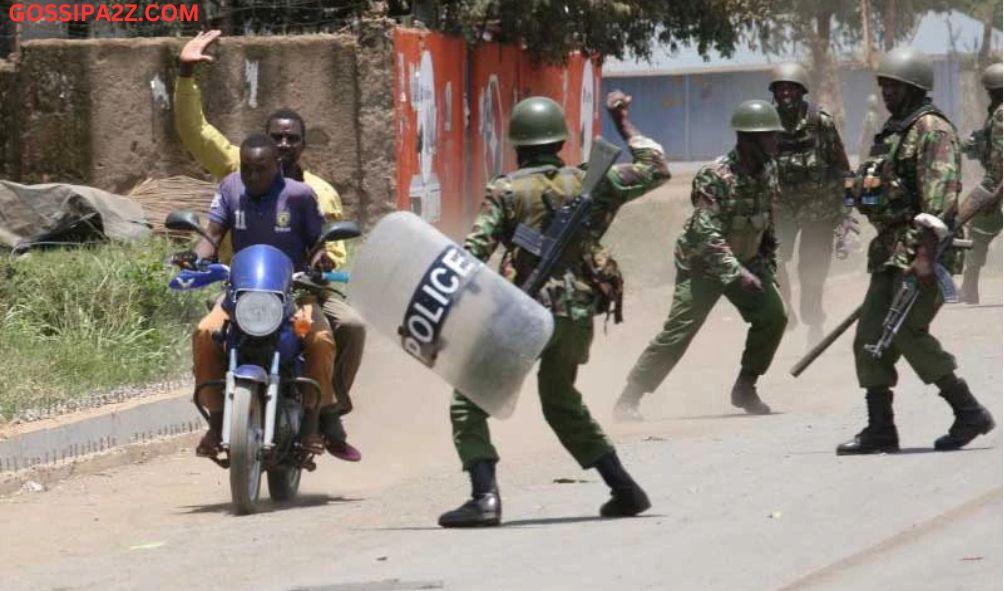Kenya’s Lead in Haiti Police Force Raises Concerns
At the same time that the U.S. government was considering Kenya to command a multinational force in Haiti, it openly warned Kenyan police officers against using excessive force. Now, 1,000 of these officers may travel to Haiti to combat gang violence.
It’s a difficult turn for a police force long accused of homicides and torture, including the murder of civilians during Kenya’s COVID-19 curfew, by human rights groups.
A local group confirmed that officers fatally shot over thirty persons in Kenya’s poorest neighborhoods in July, during opposition-called demonstrations against the rising cost of living.
In mid-July, the U.S. and 11 other nations issued a joint statement in which they stated, “We are saddened by the loss of life and concerned by the high levels of violence, including the use of live rounds” during the protests.
As this month’s U.N. Security Council president, the United States is preparing to introduce a resolution to authorize a mission in Haiti led by Kenyan police, who have relatively little overseas experience in such large numbers and neither French nor Haitian Creole, the official languages of the Caribbean nation, between them.
On Tuesday, U.S. Ambassador to the United Nations Linda Thomas-Greenfield stated, “This is not a traditional peacekeeping force.”
The United Nations had unsuccessfully sought a country to lead an endeavor to restore order to the poorest nation in the Western Hemisphere for more than nine months.
ALSO READ: Kenya’s Readiness Wins US Praise for Haiti Police Deployment
Kenya’s foreign minister announced on Saturday that his government had “accepted to positively consider” leading a force in Haiti and sending 1,000 police officers to train the Haitian National Police, “restore normalcy” and secure strategic installations.
Alfred Mutua stated, “Kenya stands with people of African descent around the world.” A ministry spokesperson declined to comment on the force or what Kenya might receive in exchange.
U.S. Secretary of State Antony J. Blinken commended Kenya on Tuesday for merely contemplating the move, highlighting the difficulty of assembling international forces for Haiti, where gang violence has exploded since the assassination of President Jovenel Moise in 2021.
Some organizations that have followed police malfeasance in Kenya for a long time are concerned.
Human Rights Watch researcher in Kenya, Otsieno Namwaya, told the Associated Press, “We consulted with Kenyan [civil society organizations] last week, and the consensus was that Kenya should not be seen as exporting its abusive police to other countries.”
Kenya’s security forces have been in neighboring Somalia for years to combat Islamic extremists — a lethal menace that some Kenyans believe should keep the police at home — and troops have been stationed in the volatile eastern Congo since last year. Sierra Leone was one of its prior UN peacekeeping deployments.
Kenya has fewer than 450 personnel in U.N. peacekeeping missions, whereas other African nations such as Rwanda, Ghana, and Egypt have thousands of personnel. There are only 32 security officers. The United States has 35 personnel serving in U.N. peacekeeping missions.
ALSO READ: Kenya’s Police Mission to Haiti Delayed: Here’s Why
Peter Kiama, executive director of the watchdog Independent Medico-Legal Unit in Kenya, told the Associated Press, “I am unaware of any complaints raised by the United Nations during these deployments.”
“Political interference with police command and independence, a lack of political will to reform the institution, a culture of internal impunity and criminality, and a lack of internal and external accountability are the major challenges facing policing practices in Kenya,” he said.
With the proposed deployment to Haiti, Kenyan police would presumably be in charge instead of a U.N. force commander, as is customary for peacekeeping missions.
Tuesday, Haitian Prime Minister Ariel Henry said he had spoken with Kenyan President William Ruto to commend Kenyans for their “demonstration of fraternal solidarity.” Kenya intends to send a task force to assess the mission’s operational requirements in the coming weeks.
Benice Pierre, a resident of Port-au-Prince, said Wednesday, “We must find someone who can assist us.”
In recent years, the U.S., the European Union, and other partners have provided Kenya’s police force with millions of dollars in training and support, with Washington focusing on “promoting police accountability and professionalism.”
However, Kenya’s National Assembly witnessed a heated debate and calls for a moment of silence last week regarding police actions during the recent protests.
Opiyo Wandayi, leader of the minority, stated that the barbarism meted out to innocent and unarmed civilians over the past few months was unprecedented. “The youth you are murdering require employment, not bullets.”
ALSO READ: Kenya Sends 1,000 Police to Aid Haiti’s Recovery – CS Mutua
The principal opposition party in Kenya has threatened to compile evidence of police abuses for submission to the International Criminal Court.
Interior Minister Kithure Kindiki responded that the police remained “neutral, impartial, and professional.” The ministry referred queries regarding alleged violations to the police, who have yet to respond.
Ruto, who was elected president of Kenya a year ago, initially praised police for their conduct during the protests, but as public outrage increased, he warned officers against extrajudicial killings.
Problems with Kenya’s police force have been acknowledged for some time, even by government officials.
Hillary Mutyambai, the inspector general of the National Police Service, stated in a late 2021 submission to a parliamentary inquiry on extrajudicial murders and enforced disappearances that there is no “shoot to kill” policy.
In contrast, the government-created Independent Policing Oversight Authority informed the investigation that it had received 95 cases of alleged fatalities caused by police action in the previous seven months alone, citing “continuous abuse of force and firearms resulting in deaths.”
A commissioner with the authority stated last month that police were violating the law by failing to report deaths as required.
Kenya’s Lead in Haiti Police Force Raises Concerns
